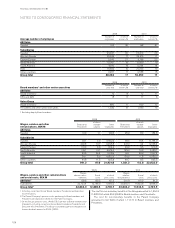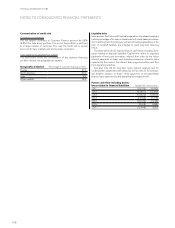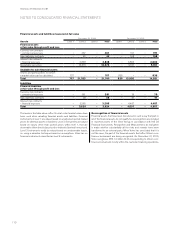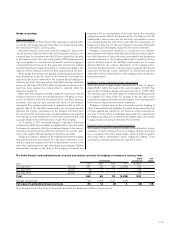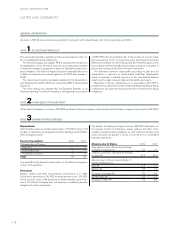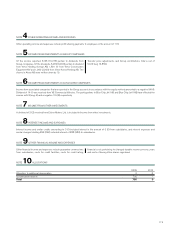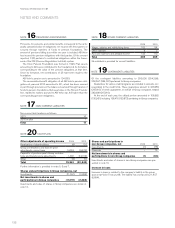Volvo 2010 Annual Report Download - page 117
Download and view the complete annual report
Please find page 117 of the 2010 Volvo annual report below. You can navigate through the pages in the report by either clicking on the pages listed below, or by using the keyword search tool below to find specific information within the annual report.
The Volvo Group’s outstanding forward contracts and options contracts for hedging of commercial currency risks
Currencies
Other
currencies
Fair
value
Million USD GBP EUR JPY Net SEK
Due date 2011 amount 687 68 93 (2,488) 570
Due date 2012 amount (4) – – – 313
Due date 2013 amount (3) – – – 20
Total 680 68 93 (2,488) 903
Average contract rate 7.04 11.03 9.37 0.08
Fair value of outstanding forward contracts 85 14 28 3 (12) 118
Hedge accounting
Cash-flow hedging
Volvo only hedges firm flows whereof the major part is realized within
six months. The hedged amount of firm flows for all periods are within
the framework of Volvo’s currency policy.
Derivative financial instruments used for hedging of future com-
mercial currency exposure that is firm and forecasted electricity con-
sumption have, in accordance with IAS 39, been reported at fair value
in the balance sheet. Since the fourth quarter 2009 hedge account-
ing is not applied on new financial instruments used for hedging of
commercial flows. However, for the major part of previously entered
financial instruments hedge accounting is continuously applied. The
majority of those financial instruments have expired during the year.
When hedge accounting is not applied, unrealized gains and losses
from fluctuations in the fair values of the financial instruments are
reported in the income statement in the segment Group headquarter
functions and other. This has positivley affected the Group’s operating
income by 124 (neg: 27) in 2010. When the derivative financial instru-
ment has been realized the income effect is reported within the
respective segments.
When cash-flow hedge accounting is applied for previously entered
financial instruments Volvo tests for effectiveness. Hedging is consid-
ered to be effective when the forecasted future cash flow’s currency
fluctuation and maturity date coincide with those of the financial
instrument. The hedging relationship is regularly tested up until its
maturity date. If the identified relationships are no longer deemed
effective, the currency fluctuations on the hedging instrument from
the last period the instrument was considered effective are reported
in the Group’s income statement. For 2010, Volvo reported 4 (loss 36)
as a gain related to the ineffectiveness of cash-flow hedging.
As of January 1, 2011 unrealized changes in fair value of financial
instruments related to a receivable or payable will be reported within
the respective segments. All other unrealized changes in fair value of
financial instruments will henceforth be reported in the income state-
ment in the segment Group headquarter functions and other.
Hedge accounting is applied on the financial instruments hedging
forecasted electricity consumption. The fair value is debited or cred-
ited to a separate component in other comprehensive income to the
extent the requirements for cash-flow hedge accounting are fulfilled.
Accumulated changes in the value of the hedging instruments are
reported in the income statement of the same time as the underlying
hedged transaction affects the Groups results. The table in note 23,
Shareholders’ equity shows how the electricity consumption reserve
has changed during the year. To the extent that the requirements for
hedge accounting are not met, any changes in the value attributable
to derivatives are immediately charged to the income statement.
Hedging of forecasted electricity is considered to be effective
when predetermined factors that affect electricity prices are in agree-
ment with forecasts of future electricity consumption and designated
derivative instruments. The hedging relationship is regularly tested up
until its maturity date. If the identified relationships are no longer
deemed effective, the currency fluctuations on the hedging instru-
ment from the last period the instrument was considered effective are
reported in the Group’s income statement. For 2009, Volvo reported
4 (4) related to the ineffectiveness of the hedging of forecasted elec-
tricity consumption.
Hedging of currency and interest rate risks on loans
Volvo has chosen to apply hedge accounting for a loan of approxi-
mately EUR 1 billion borrowed in the second quarter of 2007. Fair
value of the outstanding hedge instrument amounts to 1,168 (1,159).
The carrying value of the loan related to hedge accounting amounts
to a negative 977 (neg: 970). The changes in the fair value of the
outstanding hedge instruments and the changes in the carrying value
of the loan are reported in the income statement.
Changes in market value on the instruments used for hedging of
risk in financial assets and liabilities for which hedge accounting has
not been applied are reported in net financial income and expense,
see note 11. In the future, in applicable cases when the requirements
for hedge accounting are considered to be fulfilled, Volvo will consider
to apply hedge accounting for this kind of instruments.
Hedging of net investments in foreign operations
Volvo applies hedge accounting for certain net investments in foreign
operations. Current earnings from such hedging shall be accounted
for in a separate item within shareholders’ equity. A total of negative
202 (neg 314) in shareholders’ equity relating to hedging of net
investments in foreign operations was reported in 2010.
The hedged amount offirm flows for all periods are within the framework of Volvo’s currency policy.
113



